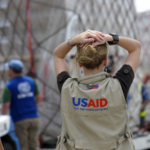Nigeria’s food security debate often revolves around production shortfalls, climate shocks, and government pledges, but a critical factor sits at the heart of the challenge: women farmers.
The Women Agro-Value Expansion (WAVE) Programme tackles systemic inequalities by giving women access to climate-smart technologies, agribusiness skills, and affordable financing.
By moving women from subsistence farming to commercial prosperity, WAVE addresses one of the most pressing challenges in Nigeria’s food system, which is low productivity caused by lack of access to resources.
This approach shifts the narrative from dependency to agency, proving that when women farmers are empowered, households, markets and national food reserves all benefit.
At the WAVE x MCC Agriculture Demonstration Centre, participants were trained on modern farming techniques, financial literacy and value-chain opportunities.
Such interventions do not only empower individuals but also strengthen cooperatives and rural economies. By connecting women to markets, both local and global, these initiatives reduce post-harvest losses and improve household nutrition.
This integrated method demonstrates that solutions to Nigeria’s food security challenge must focus not only on production but also on sustainability, inclusivity, and innovation.
A crucial element of the solution lies in addressing gender-based barriers in agriculture. While women constitute nearly 70% of Nigeria’s agricultural labour force, only a fraction have secure land rights or access to credit.
By prioritising policies that ensure land ownership, affordable credit, and institutional support for women farmers, the government is gradually turning the tide on decades of exclusion. If sustained, these measures could create a more equitable agricultural landscape, reduce poverty in rural communities, and enhance national food security.
This framing makes women not passive beneficiaries but essential actors in the country’s development journey.
Ultimately, this exemplifies how intentional, well-structured interventions can create long-term impact when combined with political will and grassroots participation.
The partnership between the federal government, the Organisation of Islamic Cooperation (OIC) and women’s cooperatives illustrates that food security cannot be achieved by government alone but requires multi-sector collaboration.
By focusing on women, who form the backbone of Nigeria’s agricultural workforce, the solutions presented are both practical and sustainable.
If scaled nationwide, these efforts could transform food security into a story of resilience, innovation and empowerment, one in which Nigerian women farmers stand not as invisible labourers but as celebrated nation-builders.
Summary not available at this time.






